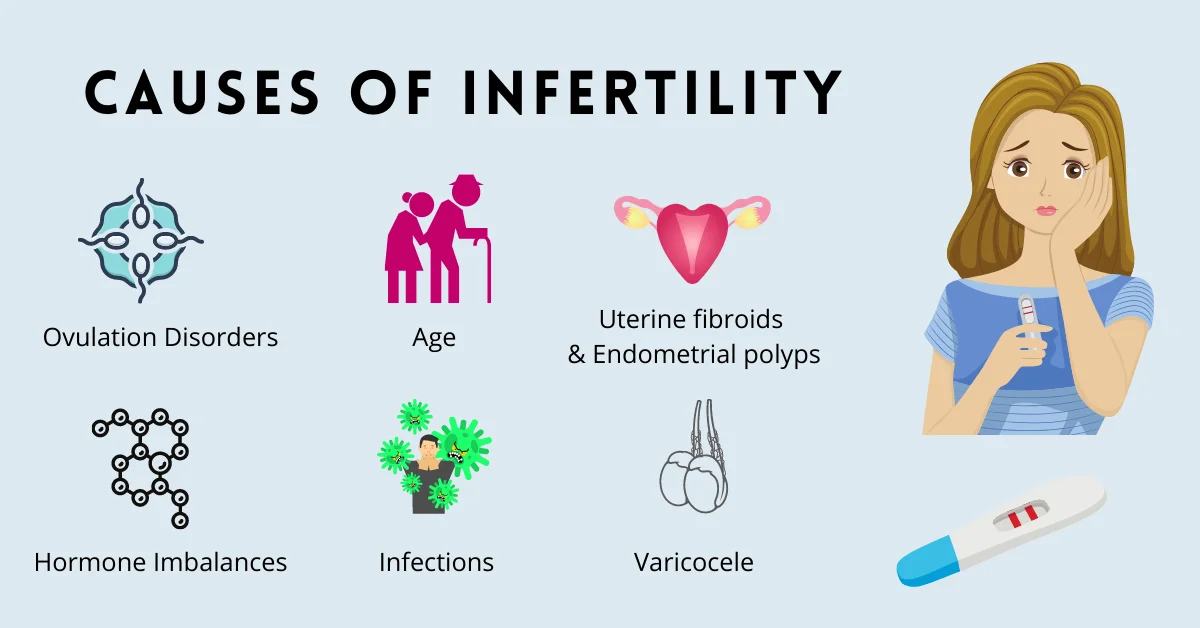
Ovulation Disorders
Ovulation disorders, meaning you ovulate infrequently or not at all, account for infertility in about 1 in 4 infertile couples. Problems with the regulation of reproductive hormones by the hypothalamus or the pituitary gland, or problems in the ovary, can cause ovulation disorders.
Polycystic ovary syndrome (PCOS). PCOS causes a hormone imbalance, which affects ovulation. PCOS is associated with insulin resistance and obesity, abnormal hair growth on the face or body, and acne. It’s the most common cause of female infertility.
• Hypothalamic dysfunction. Two hormones produced by the pituitary gland are responsible for stimulating ovulation each month — (FSH) and luteinizing hormone (LH). Excess physical or emotional stress, a very high or very low body weight, or a recent substantial weight gain or loss can disrupt production of these hormones and affect ovulation. Irregular or absent periods are the most common signs.
• Premature ovarian failure. Also called primary ovarian insufficiency, this disorder is usually caused by an autoimmune response or by premature loss of eggs from your ovary (possibly from genetics or chemotherapy). The ovary no longer produces eggs, and it lowers estrogen production in women under the age of 40.
• Too much prolactin. The pituitary gland may cause excess production of prolactin (hyperprolactinemia), which reduces estrogen production and may cause infertility. Usually related to a pituitary gland problem, this can also be caused by medications you’re taking for another disease.
Damage to fallopian tubes (tubal infertility)
• Damaged or blocked fallopian tubes keep sperm from getting to the egg or block the passage of the fertilized egg into the uterus. Causes of fallopian tube damage or blockage can include:
• Pelvic inflammatory disease, an infection of the uterus and fallopian tubes due to chlamydia, gonorrhea or other sexually transmitted infections
• Previous surgery in the abdomen or pelvis, including surgery for ectopic pregnancy, in which a fertilized egg implants and develops in a fallopian tube instead of the uterus
• Pelvic tuberculosis, a major cause of tubal infertility worldwide, although uncommon in the India.
Uterine or Cervical causes
Several uterine or cervical causes can impact fertility by interfering with implantation or increasing the likelihood of a miscarriage:
• Benign polyps or tumors (fibroids or myomas) are common in the uterus. Some can block fallopian tubes or interfere with implantation, affecting fertility. However, many women who have fibroids or polyps do become pregnant.
• Endometriosis scarring or inflammation within the uterus can disrupt implantation.
• Uterine abnormalities present from birth, such as an abnormally shaped uterus, can cause problems becoming or remaining pregnant.
• Cervical stenosis, a narrowing of the cervix, can be caused by an inherited malformation or damage to the cervix.
• Sometimes the cervix can’t produce the best type of mucus to allow the sperm to travel through the cervix into the uterus.
Endometriosis
Endometriosis occurs when tissue that normally grows in the uterus implants and grows in other locations. This extra tissue growthand the surgical removal of it can cause scarring, which may block fallopian tubes and keep an egg and sperm from uniting.
Endometriosis can also affect the lining of the uterus, disrupting implantation of the fertilized egg. The condition also seems to affect fertility in less-direct ways, such as damage to the sperm or egg.
Unexplained infertility
Sometimes, the cause of infertility is never found. A combination of several minor factors in both partners could cause unexplained fertility problems. Although it’s frustrating to get no specific answer, this problem may correct itself with time. But, you shouldn’t delay treatment for infertility.

